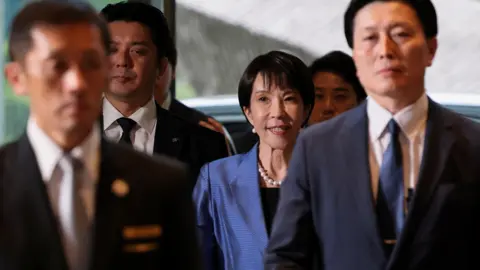Shaimaa KhalilJapan correspondent
 Reuters
ReutersFor many young girls in Japan today, the image of Sanae Takaichi taking the helm of power as the country’s first ever female leader is powerful and formative.
It means a patriarchal society and a political system that has long been dominated by men is now led by a woman.
But while the optics speak of a progressive moment, some women don’t see her as an advocate for change.
“It was quite interesting to see how people outside Japan have reacted to the news.” Ayda Ogura, 21, says.
“Everyone’s like, ‘wow, she’s the first female prime minister in Japanese history and that would be a great opportunity for women empowerment and gender equality in Japan’.
“I think that’s a very naive interpretation.”
Instead, Ms Ogura points to her “political beliefs and what she stands for”, adding: “She perpetuates the patriarchal system.”

A big fan of Margaret Thatcher, Britain’s first female prime minister, Sanae Takaichi has always wanted to be the “Iron Lady” of her country.
And like Thatcher, Takaichi is a staunch conservative.
Observers say her leadership is a tactical move from the ruling Liberal Democratic Party (LDP) to appeal to the more conservative base which had recently gravitated towards Japan’s parties further to the right.
Takaichi opposes same-sex marriage and has long stood against legislation that would allow married couples to have separate surnames, preventing many women from keeping their maiden names.
She’s also against women being in line for succession in the imperial family.
However, she did soften some of her messaging during her campaign – saying she favours giving tax incentives to companies that provide childcare facilities to their employees and spoke of possible tax breaks for families spending on childcare.
But she has over the years backed the idea of a more traditional role for women in society and in the family.
When it comes to women’s issues, Takaichi is consistent with her country’s less than impressive record on gender issues.
Japanese women are among the best educated and highest qualified in the world and yet they struggle with the expectations of a conservative society that still pushes them in traditional roles.
According to the 2025 gender gap index by the World Economic Forum, Japan ranked 118th among 148 countries, with female representation in the field of politics notably low.
Leadership positions have traditionally been dominated by men and Japan has struggled to increase the number of female lawmakers and business leaders.
The world’s fourth largest economy ranks last among the G7 countries when it comes to the share of women in its national parliament. Specifically, women make up about 15.7% of lawmakers in Japan, the lowest figure among the G7.
It is even slow when it comes to women’s reproductive health: only this week was it announced that the “morning after” pill – a form of emergency contraception available without prescription in more than 90 countries – had finally been approved for over the counter use in Japan.
Even so, some see Takaichi’s rise to power as a pivotal moment that could change how women view their prospects.
“There is great significance in Ms Takaichi becoming prime minister, with a broader impact on society,” Naomi Koshi – who became the country’s youngest female mayor in 2012 – told Japan’s Kyodo news agency.
Koshi argued Japan having a female prime minister will “lower psychological barriers” for women and girls, helping them feel it is normal to “stand out” as leaders in companies and society, even as gender-based stereotypes and expectations still remain.
But Audrey Hill-Uekawa, 20, points out that, while it is remarkable Japan has its first female leader, one must remember it took her more than 30 years to get to that position.
“She’s also not really going against the grain. She’s saying the same thing as the men.”

Ms Hill-Uekawa adds that she shouldn’t be put on a pedestal simply because she is a woman.
“We need to make sure we’re talking about her policies. We need to be able to criticise her equally as everyone else.”
It is not just what Takaichi has said which has led people to label her as a defender of the patriarchy.
It’s also evident by who her champions inside the party have been.
She’s the protégé of the late former hawkish prime minister Shinzo Abe, and was backed in the leadership election by Taro Aso – a senior figure in the LDP at the head of one of the ruling party’s most influential conservative blocs.
His faction’s support for Sanae Takaichi was pivotal in uniting the party’s right wing behind her.
“I do feel that it is difficult for women to sort of relate to her success because it furthers this idea that we must be compliant with the status quo,” 21-year-old Minori Konishi says.
Ms Ogura agrees, saying that with her as a figurehead for women in politics, “people are going to expect the same from us as well”.
“They’re going to expect us to be compliant, not go against the ideals that they have, and it might make our job more difficult.”
Making history, however, was just the first of the challenges Takaichi will face – not least tackling a sluggish economy and inflation and winning back the trust of a frustrated and angry electorate, as well as hosting president Trump within days of taking power.
It’s safe to say that no-one expects gender equality issues to be high on her priority list.

